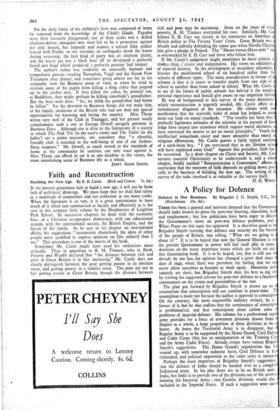Faith and Reconstruction
Building the New Age. By E. B. Castle. (Rich and Cowan. 7s. 6d.) IF the present generation fails to build a new age, it will not be from lack of architects' drawings. We must hope that we shall find safety in a multitude of counsellors and not confusion in too many cooks. When the literature is so vast, it is a great convenience to have much of it sifted and summarised as lucidly and effectively as is the case in this compact little volume by the Headmaster of Leighton Park School. In successive chapters he deals with the economic basis of a Christian co-operative democracy, with our educational system, with the international society, the British Empire, and the future of the family. As he says in his chapter on international affairs, his suggestions " incorporate shamelessly the ideas of other people more qualified to express opinions on [the subject] than I am." This procedure is one of the merits of the book.
Sometimes Mr. Castle might have used his authorities more critically. Thus in appealing to R. M. Titmuss, who in Birth, Poverty and Wealth declared that " the distance between rich and poor in Great Britain is in fact increasing," Mr. Castle does not clearly distinguish between the poor getting poorer in an absolute sense, and getting poorer in a relative sense. The poor are not in fact getting poorer in Great Britain, though the distance between rich and poor may be increasing. Even on the issue of relafi poverty, R. M. Titmuss overstated his case. Similarly, Mr. Cas follows E. H. Carr too closely in his comments on American a British policy in The Twenty Years' Crisis. Great Britain was blindly and selfishly defending the status quo when Neville Chamb lain gave a pledge to Poland. The " Haves-versus-Have-nots " mo is overworked by E. H. Carr and those who follow him.
If Mr. Castle's judgement might sometimes be more critical, it alwhys clear, c xisive and independent. His views on education of especial interest. In the development of secondary education. favours the multilateral school of six hundred rather than thr schools of different types. The main consideration in favour of scheme is that it is easier to transfer pupils from one side of school to another than from school to school. What Mr. Castle to say of the future of public schools has behind it the weight personal experience and should give pause to our impatient level] By way of background to this survey of the many directions which reconstruction is urgently needed, Mr. Castle offers us introductory diagnosis of the situation. He claims with so justification that the scientific habit of mind has helped. to and mine our hold on moral standards. " The trouble has been that perfectly legitimate attitudes of the scientist in his pursuit of kno ledge have seeped into situations which require moral decisions a have enervated the motive to act on moral principles." Youth fin intellectual iconoclasm easier and more attractive than moral a religious affirmation. Mr. Castle quotes a fairly typical sentime of a sixth-form boy. " I am convinced that in my lifetime scie will have explained away God." Against this prejudice, faith has be reasserted. In a short chapter on Christ and Society, Mr. Cas restates essential Christianity as he understands it, and a clos chapter, boldly entitled "Reconstruction is Conversion," affirms conviction that the recovery of faith depends on getting down prat cally to the business of building the new age. The setting of t survey of the tasks involved is as valuable as the survey itself.
H. G. WOOD.


























 Previous page
Previous page